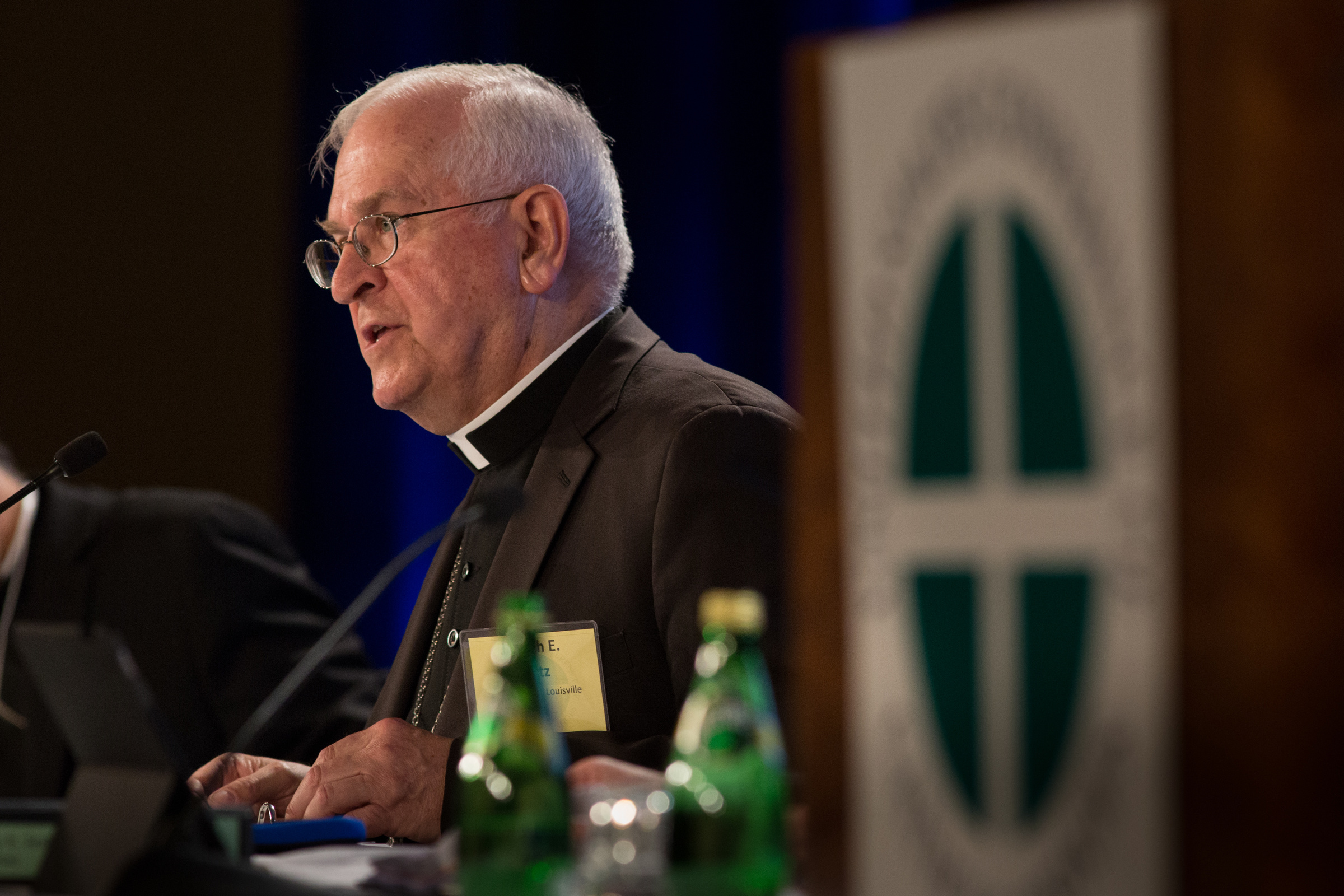
Archbishop Joseph Kurtz of Louisville, Ky., president of the U.S. Conference of Catholic Bishops speaks June 10 during the annual spring general assembly of the U.S. Conference of Catholic Bishops in St. Louis. (CNS/St. Louis Review/Lisa Johnston)
Amid updates on the pope’s coming U.S. trip, pending Supreme Court cases and immigration, bishops gathered here for their annual spring meeting also received a review of the top-10 plus two points made in the summary document sent to the Vatican for the upcoming Synod of Bishops on the family.
The 12 general points touched on a desire for clearer communication from pastors on the meaning of marriage, the importance of married couples witnessing and evangelizing other married couples, and a lacking in pastoral care for those separated, divorced and remarried.
Louisville, Ky., Archbishop Joseph Kurtz, president of the U.S. Conference of Catholic Bishops, delivered the summary Wednesday afternoon to the contingent of 200-plus bishops present. He said of the 195 dioceses and archdioceses, 126 of them submitted responses to the synod consultation.
Related: “Most US dioceses consult Catholics on family issues for fall synod”
The U.S. bishops’ conferences, like other episcopal conferences across the globe, then compiled the reports into a single executive summary that was sent in April to Rome, as requested by the Vatican. Kurtz noted that the conference also submitted to the Vatican the individual diocesan reports.
The ordinary synod will take place Oct. 4-25 in Rome, the second part of a two-year process that saw the Extraordinary Synod of Bishops occur last October. In 2013, Pope Francis called for the synod, which focuses on the theme of “The Vocation and Mission of the Family in the Church and Contemporary World.”
While the Holy See requested the bishops not distribute or make public the results of the consultation, Kurtz said he was able to give a general review of the results.
The archbishop said there appeared “an eagerness on the part of the faithful” to assist in the consultation and appreciated the opportunity. As for the 46 synod questions themselves, contained in the lineamenta, they were frequently described as “especially challenging.”
“The questions themselves left something to be desired … I guess I’m being very polite on that,” Kurtz said, to laughter from the assembly.
Several of the 12 points repeated themes that arose during the consultation for the extraordinary synod. That included stressing the importance of married couples witnessing and evangelizing to other married couples. Kurtz said this latest consultation particularly stressed the church’s role in challenging relativism and carrying out effective ministry.
“We might say that the family was seen as a subject of evangelization and not simply an object receiving,” he said.
Also a carryover observation was pastoral care for people who are separated, divorced and remarried “continues to be greatly needed, especially to make sure the persons in these situations do not feel separated from the church and disconnected.” A follow-up observation presented “a strong call for bishops” to consider removing unnecessary obstacles from the annulment process.
Several of the observations dealt with pastors and their engagement in family ministry. Kurtz noted “a strong endorsement that we as pastors … have much ground to cover in sharing the Good News of the Gospel on the family,” specifically mentioning better communication on the meaning of marriage as one man and one woman, the call for married couples to be open to having children and the dignity and responsibility of the marriage vocation.
“That was a common theme: We need to do a better job in the way we communicate,” he said.
Other pastoral issues described a need to improve ongoing priestly formation in pastoral care of families; a number of people mentioned a desire that families have a role in educating priests, particularly at the parish level.
Other points from the general summary:
- An ongoing desire from married couples and families for prayer formation, and that homilies catechize about marriage using acceptable language and everyday examples;
- A desire for parishes to develop a “parish intentionality” around the family by considering the whole intergenerational family in developing programs, as well as keeping in mind those without family and in fragile circumstances;
- A need for personal encounters between priests and the faithful, but also among married couples and their families;
- Much discussion of the challenges posed by contemporary society and a call for the church’s public witness to continue;
- Areas noted as missing from the relatio: absence of marriage as a vocation; lack of attention on teachings of Pope John Paul II; discussion of specific situations, such as pornography, blended families, and single adults;
- A need among parents “to understand, embrace, and be equipped to fulfill their role as the primary educator of children in faith.”
Asked if there was a sense of confusion in the U.S. church, as reports following the extraordinary synod suggested, Chicago Archbishop Blase Cupich said he didn’t sense so much confusion as rather a free discussion of different points of view, as Pope Francis requested.
“If confusion means there is no universal position, then maybe confusion is the word. But I think it’s fluid right now,” he told NCR after one of the sessions. “…We have a discussion about these matters to deal with the pastoral situation that people are living in.”
Likewise, San Diego Bishop Robert McElroy told NCR the better word would be “complex” to describe the discussions around two issues: How to evangelize effectively the beauty of marriage, particularly to youth, in the contemporary American society, and how to effectively and sensitively help those struggling in marriages, those who are divorced or those who are gay.
“I don’t think it was confusion as much as these are complex questions. I think it would be complex for the synod to try to wrestle with those,” he said.
[Brian Roewe is an NCR staff writer. His email address is broewe@ncronline.org. Follow him on Twitter: @BrianRoewe.]
